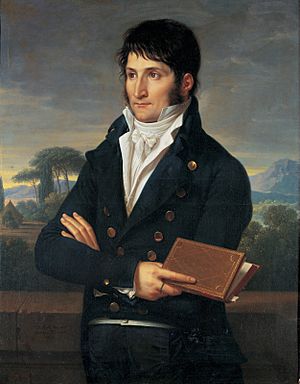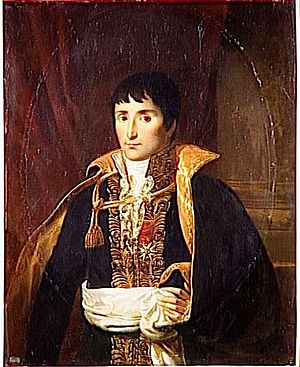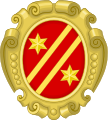Lucien Bonaparte facts for kids
Quick facts for kids
Lucien Bonaparte
Prince of Canino and Musignano
|
|
|---|---|

Portrait by François-Xavier Fabre, 1808
|
|
| Minister of the Interior | |
| In office 25 December 1799 – 7 November 1800 |
|
| Preceded by | Pierre-Simon Laplace |
| Succeeded by | Jean-Antoine Chaptal |
| President of the Council of Five Hundred | |
| In office 23 October 1799 – 12 November 1799 |
|
| Preceded by | Jean-Pierre Chazal |
| Succeeded by | Antoine Boulay de la Meurthe |
| Member of the Council of Five Hundred for Liamone | |
| In office 12 April 1798 – 26 December 1799 |
|
| Personal details | |
| Born | 21 May 1775 Ajaccio, Corsica, France |
| Died | 29 June 1840 (aged 65) Viterbo, Papal States |
| Spouses |
Christine Boyer
(m. 1794; died 1800)Alexandrine de Bleschamp
(m. 1802) |
| Parents |
|
| Signature |  |
Lucien Bonaparte (born Luciano Buonaparte; 21 May 1775 – 29 June 1840) was an important French politician and diplomat. He lived during the time of the French Revolution and the Consulate. He was the Minister of the Interior from 1799 to 1800. He also served as the president of the Council of Five Hundred in 1799.
Lucien was the younger brother of Napoleon Bonaparte, who became a famous leader. As president of the Council of Five Hundred, Lucien played a key role in the Coup of 18 Brumaire. This event helped Napoleon gain power in France.
Contents
Early life and education
Lucien was born in Ajaccio, Corsica, on May 21, 1775. He went to school in mainland France. He first studied at military schools like Autun and Brienne. After his father passed away, he went to a seminary in Aix-en-Provence. He left the seminary in 1789.
Corsica, where Lucien was born, had been taken over by France in 1769. His father, Carlo Bonaparte, first supported Corsican freedom fighters. But later, he supported French rule.
Joining the Revolution
Lucien strongly supported the French Revolution when it began in 1789. He was only 14 years old at the time. He went back to Corsica and became a strong speaker. He joined the Jacobin Club in Ajaccio and even used the nickname "Brutus Bonaparte."
In 1791, he worked as a secretary for Pascal Paoli. However, he later disagreed with Paoli in May 1793, along with his brother Napoleon.
After returning to France, Lucien held several small government jobs. From 1793 to 1795, he was briefly put in jail. This happened because of his support for the Jacobins during a time called the Thermidorian Reaction. Napoleon helped him get released. Then, Napoleon found him a job with the Army of the North.
Political career and rise to power
Leading the Council of Five Hundred
In 1798, Lucien was chosen to be a member of the Council of Five Hundred. He represented the Liamone area of Corsica. Later, he became the president of the Council. He moved the Council to a safer location outside Paris.
Lucien played a very important part in the coup d'état of 18 Brumaire. This was a big event where Napoleon Bonaparte took over the government. On November 9, 1799, Napoleon replaced the Directory with the Consulate. Lucien bravely spoke to soldiers, pointing his sword at Napoleon. He swore to harm his brother if Napoleon ever betrayed the ideas of "Liberty, Equality, Fraternity." The next day, Lucien helped Napoleon officially become the First Consul.
Working as a diplomat
Napoleon made Lucien the Minister of the Interior. In this role, Lucien helped manage the results of a public vote for First Consul. This led to some competition with Joseph Fouché, the chief of police. Fouché showed Napoleon a critical pamphlet that might have been written by Lucien. This caused a disagreement between the brothers.
Later, Lucien was sent as an ambassador to Spain in November 1800. He was very good at his job. He managed to win over the Spanish royal family and their important minister, Manuel de Godoy.
Disagreements with Napoleon
Even though he was a member of the Tribunat and later a senator, Lucien often disagreed with Napoleon. In 1804, Napoleon wanted to declare himself Emperor of the French. He also wanted Lucien to marry a Spanish princess. Lucien did not like these ideas. He refused all special honors and decided to live in Rome, Italy, on his own. He bought a large property there called the Villa Rufinella.
Later life and family

In 1809, Napoleon tried to pressure Lucien to divorce his wife and come back to France. Even their mother wrote to Lucien, asking him to return. At this time, the Papal States (where Lucien lived) were taken over by France. Lucien became like a prisoner on his Italian estates. He needed special permission to leave his property.
He tried to sail to the United States to escape his situation. But he was caught by the British. When he arrived in Britain, people cheered for him. Many saw him as someone who stood up to Napoleon.
The British government allowed Lucien and his family to live comfortably. They stayed first in Ludlow and then at Thorngrove House in Grimley. While there, Lucien worked on a long poem about Charlemagne. Napoleon believed Lucien had purposely gone to Britain and saw him as a traitor. Because of this, Napoleon removed Lucien from the official list of Bonapartes from 1811 until Napoleon gave up power in 1814.
Lucien returned to France after Napoleon stepped down in April 1814. He then went to Rome. On August 18, 1814, Pope Pius VII made him the Prince of Canino. He also received other titles. Later, on March 21, 1824, Pope Leo XII made him Prince of Musignano.
During the Hundred Days, when Napoleon briefly returned to power, Lucien supported his brother again. Napoleon made him a French Prince. However, this was not recognized by the new French government after Napoleon's second defeat. Lucien was then banned from his seat at the Académie Française. In 1836, he wrote his memories.
Lucien died in Viterbo, Italy, on June 29, 1840. He passed away from stomach cancer. This was the same illness that affected his father and, it is believed, his brother Napoleon.
Interests and hobbies
Lucien Bonaparte was interested in many things. He helped bring back the Académie Française in 1803, where he became a member. He collected paintings and enjoyed social gatherings. He also wrote a novel called La Tribu indienne.
He was an amateur archeologist, meaning he enjoyed digging up old artifacts. He started excavations on his land in Frascati. There, he found a complete statue of Tiberius. At Musignano, he found a bust of Juno. He owned land that was once part of Cicero's estate. In 1825, he found a famous portrait of Julius Caesar at the Tusculum's forum.
In 1823, Lucien Bonaparte was chosen as a member of the American Philosophical Society.
Family life
Lucien had two wives and many children.
His first wife was Christine Boyer (1771 – 1800). She was the daughter of his landlord. They had four children:
- Filistine Charlotte (1795 – 1865), who married Prince Mario Gabrielli.
- A son who was stillborn (1796).
- Victoire Gertrude (born and died 1797).
- Christine Egypte (1798 – 1847), who married Count Arvid Posse and later Lord Dudley Stuart.
His second wife was Alexandrine de Bleschamp (1778 – 1855). She was a widow known as "Madame Jouberthon." They had ten children:
- Charles Lucien Bonaparte (1803 – 1857), who became a naturalist and expert on birds.
- Letizia (1804 – 1871), who married Sir Thomas Wyse.
- Joseph (1806 – 1807).
- Jeanne (1807 – 1829), who married Marquis Honoré Honorati.
- Paul Marie (1809 – 1827).
- Louis Lucien (1813 – 1891). He studied languages and was an expert on the Basque language.
- Pierre Napoleon (1815 – 1881).
- Antoine (1816 – 1877), who married Marie-Anne Cardinali. They had no children.
- Marie Alexandrine (1818 – 1874), who married Vincenzo Valentini, Count di Laviano.
- Constance (1823 – 1876), who became a nun.
Coat of arms
-
Coat of arms as a French prince during the Hundred Days
See also
 In Spanish: Luciano Bonaparte para niños
In Spanish: Luciano Bonaparte para niños
 | Selma Burke |
 | Pauline Powell Burns |
 | Frederick J. Brown |
 | Robert Blackburn |




